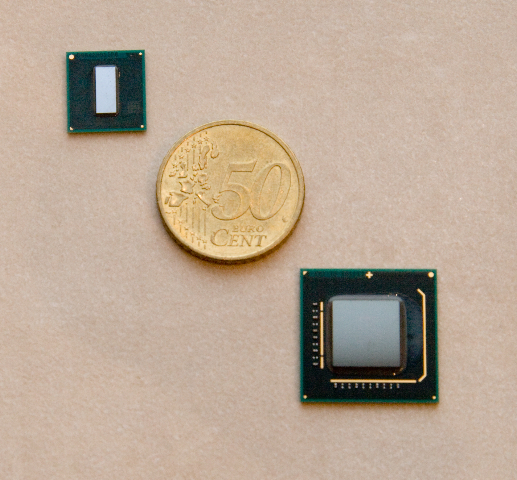Intel: Atom is Eating into Celeron, and That's OK
That's not the same as eating celery, right?
These days when someone is in the market for a portable computer, the choices now include netbooks. Most casual internet users mainly surf the web according to their interests and keep communicate via email and social networking sites.
With netbooks being the inexpensive solutions that they are, it’s easy to see why they’re eating into sales of notebooks. In fact, Intel puts netbook cannibalization of notebooks at around 16 percent – which means that the notebook segment lost around a sixth of its sales to the cheaper netbooks. This is of some concern to the industry as lower priced products could mean lower profits, but Intel doesn’t seem worried.
In fact, Intel argues that netbooks aren’t exactly taking over notebooks, at least not in a negative way, and has more untapped selling potential.
“The market has not all lept over to Netbooks,” said Intel Chief Sales and Marketing Officer Sean Maloney, according to CNet. “We're very comfortable with having established the (Netbook) category. We believe now that Netbooks are an under-distributed product line.”
Those looking to get a laptop for cheap are likely looking at Celeron-powered machine, and if the consumer buys an Atom instead, that doesn’t bother Intel.
“Atom is eating into Celeron. And we're quite fine with this,” Maloney said.
“There's great concern about the potential of the Atom mix because it's a lower selling price product, but it's also a lower cost product,” said Intel CFO Stacy Smith in a Reuters story. “And that cost really enables us to ramp it without having an adverse effect on the overall product margin of the business.”
Get Tom's Hardware's best news and in-depth reviews, straight to your inbox.
Smith added that the Intel Atom costs a quarter of what it does to produce a quad-core chip (without specifying which quad-core).
This summer those shopping for a laptop will get another option thanks to Intel rolling out CULV (consumer ultra low voltage) chips that’ll enable affordable thin and light notebooks priced between netbooks and full-featured notebooks. We’ll likely get to see more of those at Computex next week.
-
tacoslave a quarter of what it costs to make a quad core!!?!??!?!?! atom what the hell?? so why the hell do they sell the damn quads so expensive!?!? was it the developement costs or what. I think its time the introduce the 100< dollar core 2 quad.Reply
http://www.engadget.com/2008/03/30/atom-processor-to-cost-intel-just-6-to-8/
-
joefriday The Celeron Needs to be single core with HT, and have REAL speedstep. Then I would think Celeron would be a great budget CPU. The current single core Conroe-L celeron is pretty good, but HT ability would make it even more usable, and a speedstep with ultra-low voltage/MHz at idle (e.g. bring back the Pentium M power states) would make it a delight for a low power everyday machine. Don't really care for the Dual core Celerons. I feel that gap should instead be filled with faster single core Celerons and let the Pentium Dual core be Intel's entry into real multicore processing.Reply -
liemfukliang If I have to choose $400 I will buy a normal laptop with Celeron. Why? Because it is fully functional laptop with a fully functional screen (14").Reply -
Luscious If Intel does indeed plan to introduce a dual-core Atom this year or next year with Medfield, I see no reason why the Celeron brand should stay on. Even cheap desktops being sold today are now using the Atom.Reply -
If only Atom wasn't slower than a Celeron... Computer's are supposed to get faster over time, AFAIK this is the first time they've ever gotten slower... Well done.Reply
-
Belardo Because vista is a resouce hog that will totally bog down a P3 1.x type of CPU (such as the atom) which otherwise runs okay on a little computer with a little bitty battery... that is what is made for. Low power, cost & sizeReply
If price is a factor, the AMD64 X2 dual core CPUs are $30~60 and are easily several times more powerful than Atom, Celerons and Pentium Dual Core, which these AMDs are fine for desktops and can run Vista/Win7.
-
industrial_zman ok for those who haven't been really keeping up with processors, a Celeron CPU is the same core as a current main stream processor. In this case, the current mobile Celeron is a C2 Merom or Penryn. What's the difference? Lower FSB, no support for virtualization and lower amount of cache on chip. And haven't been confirmed yet, but there are rumors from my Intel buddies that there are dual core Celerons on their way to notebooks by the end of the year.Reply
joefriday, the Celeron brand has had REAL speedstep since Jan 08, started with the 1000 series.
luscious, Atom chips are already dual core AND HT to boot. check out the Atom N330. now what I'm hoping for in the future is a native dual core Atom. Intel is not looking at releasing the next version of the Atom until they have exhausted their supply of old crusty inventory of 945GC chips first. In the mean time, they can play court with nVidia over the Ion and refine the next generation of Atom to truely be a native x86(x64) SOC.

